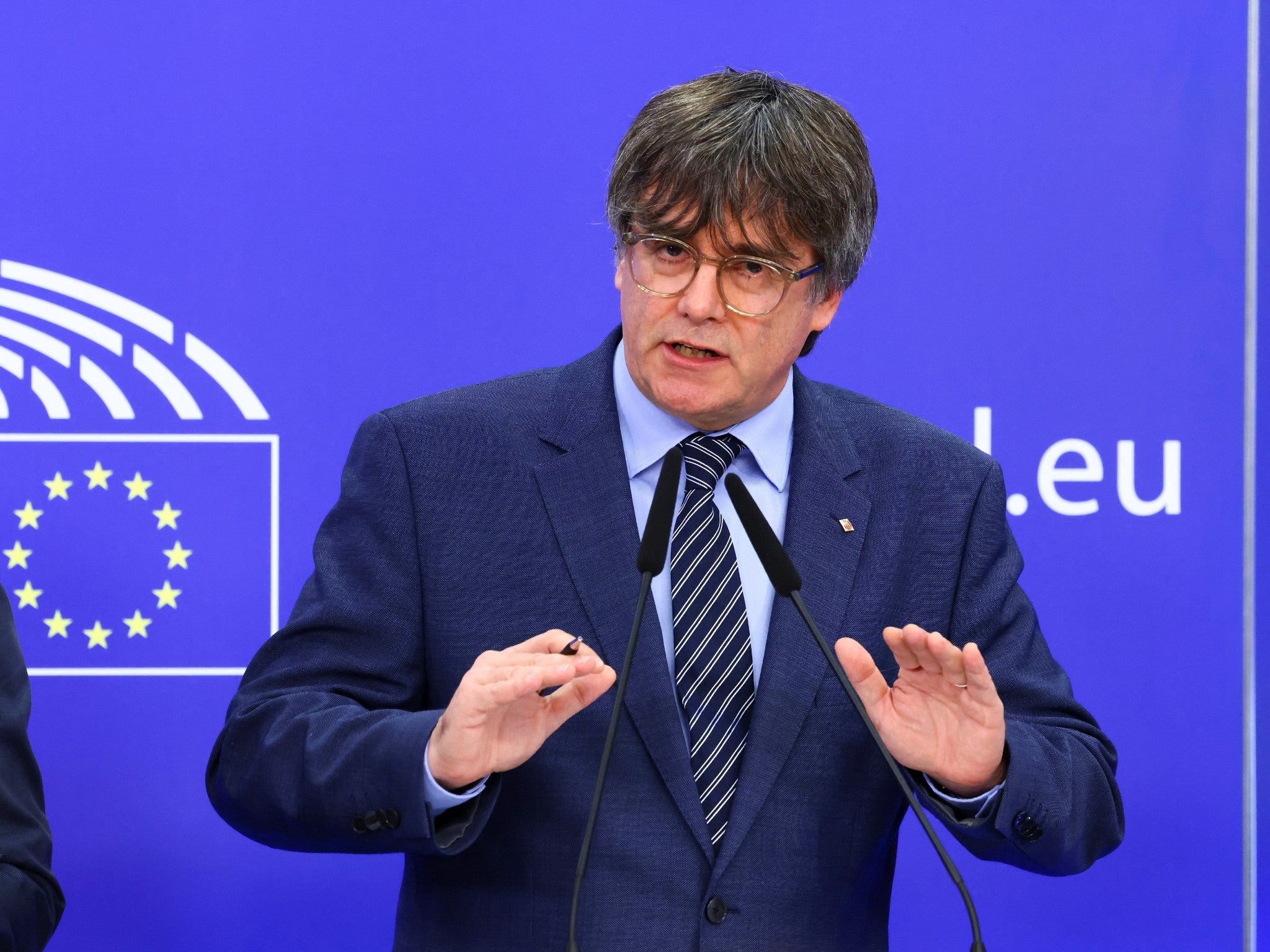Spain’s most famous fugitive may hold key to forming country’s next government
After a deadlocked election, the former Catalonia leader Carles Puigdemont, who lives in self-imposed exile after a failed independence bid, will be crucial to the Socialists pulling together a coalition, writes Graham Keeley


Spain’s most famous fugitive – former Catalan leader Carles Puigdemont – could be key to hopes to form a new government after a snap election failed to find any outright winner.
Puigdemont, who has lived in self-imposed exile in Belgium for nearly six years since leaving Spain after a failed independence bid in 2017, is the ideological head of the hardline Catalan separatist Junts per Catalunya party, which has seven seats.
This could be enough for Spain’s Socialist prime minister Pedro Sanchez to piece together a coalition government and claw his way back to power, but it would come at a political cost, analysts said.
“Puigdemont or deadlock” ran the front-page headline in white on a black background in ABC, a right-wing daily. But that hasn’t stopped Spanish state prosecutors from asking a judge to issue an arrest warrant for Puigdemont.
“One day you are decisive in order to form a Spanish government, the next day Spain orders your arrest,” Puigdemont tweeted.
At present, Spain faces the prospect of deadlock after the opposition conservative People’s Party (PP) won the largest share of votes with 136 seats in comparison with the ruling Socialists who secured 122. The far-right Vox won 33 seats, down from 52, and the far-left Sumar party won 31 seats.
The results leave Spain heading for another election unless the PP or the Socialists can form a coalition government. The PP and Vox do not have enough seats together for a majority and few other parties will side with the conservatives – particularly given Vox’s toxic policies.
The results did show, by way of a drop in seats, that Spain has turned its back on Vox, which campaigned to repeal liberal laws introduced by Sanchez on transgender rights, abortion and animal rights. This would make any coalition that included the party an even more difficult sell to voters.
The Socialists and their nearest allies, the far-left Sumar, only have a total of 153 seats. Sanchez enlisted the support of the Catalan and Basque separatists to support the last government, but Junts de Catalunya did not support the left-wing coalition.
The Republican Left of Catalonia (ERC) party, which also holds seven seats, is willing to support a government led by Sanchez to prevent a coalition between the conservatives and the far right by “building an alternative”. But the Socialists will “have to respect Catalonia”.

In return for its support, the more hardline Junts may demand a price. MP Miriam Nogueras said during the campaign that her party demanded a referendum on independence in Catalonia and amnesty for those convicted in connection with the breakaway bid in 2017.
Puigdemont is wanted by the Spanish justice system for disobedience and embezzlement charges, which carry a jail term of up to eight years, in relation to the breakaway bid nearly six years ago.
Sanchez opposes independence and would have to change the Spanish constitution to allow a referendum by a majority of votes in the parliament, which is certain to fail.
It is within his power to grant amnesties to Catalan separatists who may have been convicted of offences, but he will be loath to tamper in the workings of the judicial system for cases which are ongoing.
Granting an amnesty for Puigdemont would prove political suicide even for Sanchez, a leader who has crossed many taboos by dealing with EH Bildu, the political wing of ETA, the former terrorist organisation.
Puigdemont tweeted on Sunday that he wanted an amnesty and a referendum.
Lola García of the newspaper La Vanguardia wrote on Monday that Puigdemont and his party want Spain to pay for its role in the political crisis caused by the Catalan independence drive.
“Puigdemont could even assume that an amnesty would exclude him but he wants to make it clear … that the Spanish state must bear responsibility for what happened in 2017,” she said.
Puigdemont claims that Spain sent hundreds of police to crack down heavily on a peaceful referendum and unjustly jailed the leaders of the independence bid. The Constitutional Court declared the vote illegal and ordered police to stop it taking place. Nine Catalan leaders were imprisoned.
When the Spanish parliament reconvenes on 17 August, politicians have two months to form a government or another election must be called, although unofficial horse trading will no doubt be happening now.
While Spain drifts in political limbo, a deal over the future of Gibraltar remains unlikely, making for more uncertainty for the Rock’s 34,000 inhabitants.
Join our commenting forum
Join thought-provoking conversations, follow other Independent readers and see their replies
Comments
Bookmark popover
Removed from bookmarks